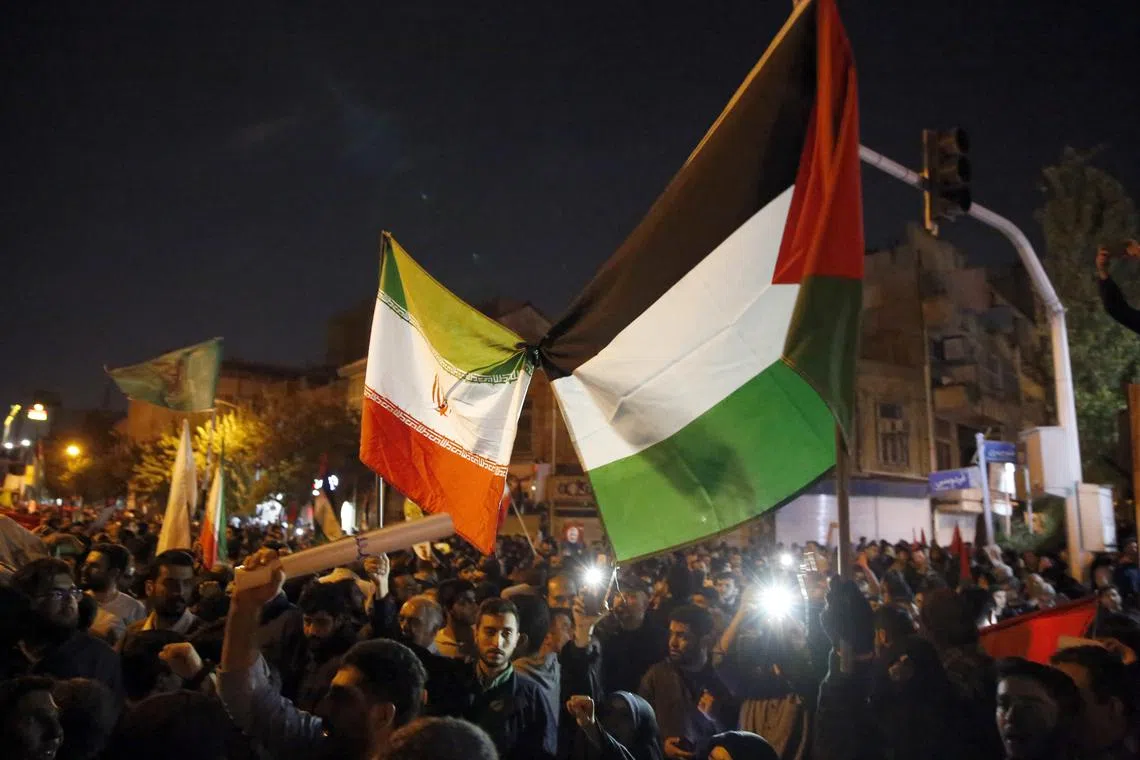Iran's Middle East allies primed as Israel-Hamas war rages
Sign up now: Get ST's newsletters delivered to your inbox

Pro-Palestine supporters gathered to show their solidarity with Gaza people in front of the British embassy in Tehran, Iran, on Oct 18.
PHOTO: EPA-EFE
BEIRUT – The war between Israel and the Palestinian group Hamas has already spilled into the wider region and risks expanding further, with Teheran backing an array of heavily armed groups.
Hamas and its Palestinian ally Islamic Jihad are part of a Iran-backed alliance called the “Axis of Resistance”. Iran’s Revolutionary Guards warned on Oct 17 of further action by Teheran’s allies against Israel if it did not cease its attacks.
Since the war erupted on Oct 7,
Here is what you should know about Iran and its allies across the region.
Lebanon
Hezbollah, meaning "Party of God", was set up by Iran's Revolutionary Guards in 1982 with the aim of fighting Israeli forces that had invaded Lebanon. It has remained a sworn enemy of Israel, which sees the group as the biggest threat at its borders.
Since the Hamas attack on Israel on Oct 7, Hezbollah has been trading fire with Israeli forces
Since then, its arsenal has expanded and its fighters – who number in the tens of thousands – have fought in Syria in support of President Bashar al-Assad in the Syrian civil war.
Hezbollah has trained paramilitary groups in Syria and Iraq and inspired other forces such as Yemen's Iran-allied Houthis.
Washington deems Hezbollah a terrorist group.
The United States holds Hezbollah responsible for a suicide bombing that destroyed the US Marine headquarters in Beirut in October 1983, killing 241 servicemen, and two suicide bombings on the US embassy in 1983 and its annex in 1984.
Referring to those attacks and hostage-taking, Hezbollah leader Sayyed Hassan Nasrallah said in a 2022 interview they were carried out by small groups not linked to Hezbollah.
Iraq
The us military thwarted an attack targeting its forces in Iraq early on Oct 18, intercepting two drones before they could strike, two US officials said after the first such attack on their forces in Iraq in more than a year.
Iran-backed Shi'ite groups emerged as powerful players in Iraq after the 2003 US-led invasion. With tens of thousands of fighters, they played a leading role in battling Islamic State, fighting as part of the Hashid Shaabi, or the Popular Mobilisation Forces (PMF).
Some of the Iran-backed Iraqi groups have fought in Syria in support of Mr Assad, another ally of Teheran.
They have a track record of attacking US positions in Iraq. Reuters reported in 2021 that Iran had established covert Iraqi groups trained in drone warfare, among other tactics.
Syria
Iran's Revolutionary Guards deployed to Syria during the civil war to help its ally Assad fight rebels. Teheran has always said Iranian forces are there in an advisory role at Syria's invitation. Hundreds of Iranians have been killed.
Other Iran-backed Shi'ite groups backed by Teheran have played a vital combat role in Syria, including groups from Afghanistan and Iraq.
Iran-backed forces have deployed across much of government-held Syria during the war, including at the Iraqi border and near the Israeli-occupied Golan Heights.
Israel has mounted airstrikes targeting Iranian and Iran-backed forces.
Yemen
Yemen's Houthi leader said on Oct 10 that if US forces intervened in the Gaza conflict directly, the group would respond by firing drones and missiles.
Iran champions the Houthis, who have been battling a Saudi-led military alliance in Yemen since 2015, as part of its regional "Axis of Resistance".
Saudi Arabia and its allies accuse Iran of arming and training the Houthis. But the extent of the relationship is disputed and Teheran has denied funnelling weapons into Yemen.
The Houthis’ military clout includes ballistic missiles that they have used against Saudi Arabia, including energy installations. They deny being Iranian proxies and say they manufacture their own weapons.
The coalition also accuses them of attacks on commercial vessels in the Red Sea using explosive-laden boats.
The Houthis claimed responsibility for an attack that temporarily cut more than half of Saudi oil output in September 2019. The United States said Iran was behind the attack, which Teheran denied.
Gulf waters
Friction between Iran and the West has long played out in Gulf waters through which much of the world's oil is shipped. Since 2019, there have been a series of attacks on shipping there at times of tension between the United States and Iran.
The US Fifth Fleet, based in Bahrain, is tasked with protecting commercial shipping in the area. Iranian naval forces include fast-boats operated by the Revolutionary Guards.
In July, the US Navy said it had intervened to prevent Iran from seizing two commercial tankers in the Gulf of Oman. REUTERS


